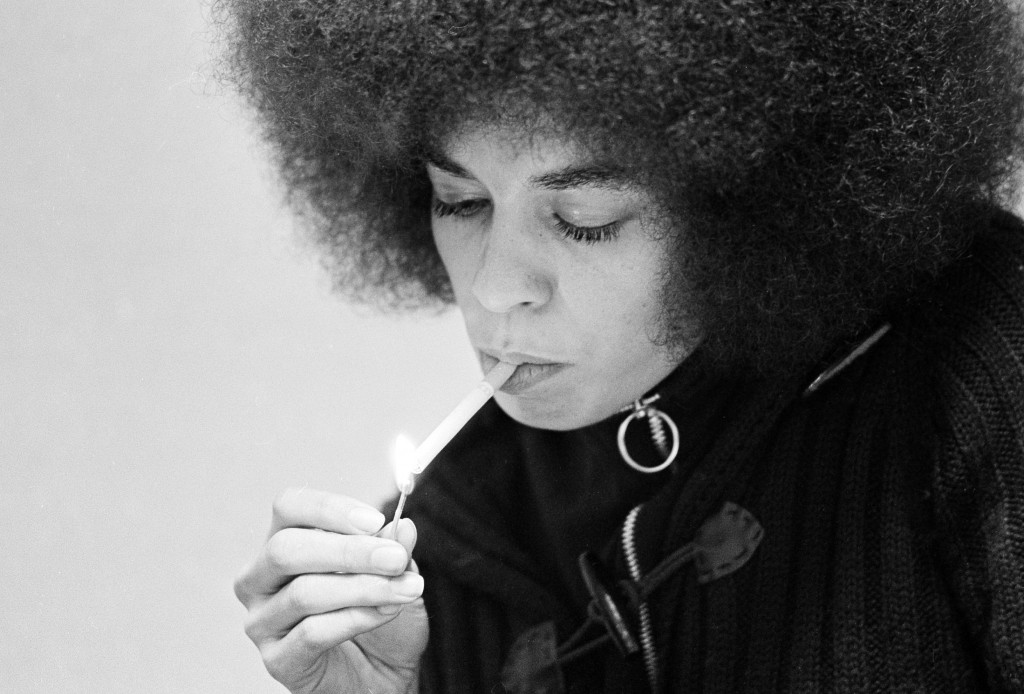Political activist, academic and author Angela Davis will speak at Gonzaga University on October 25.
Flyers advertising the event popped up around campus shortly after it was announced. And not long after those flyers went up, another set appeared, this time featuring Davis' mugshot and the title, "Angela Davis Fact Sheet," the Spokesman-Review reports.
The "Fact Sheet" flyers are the work of Gonzaga's College Republicans Club, and feature "facts" about Davis, like that she was on the FBI's Most Wanted list for kidnapping and murder.
There's only one problem with that fact. It ignores the facts of the case.
While Davis was indeed on the FBI's Most Wanted list, and originally charged with "aggravated kidnapping and first degree murder," she was not present at the scene of the murder or kidnapping. Davis was charged with this crime because she purchased a weapon that was used in in a failed attempt by Jonathan Jackson to free prisoners that were on trial at a California Courthouse.
A quirk of California law states that "all persons concerned in the commission of a crime, whether they directly commit the act constituting the offense … [are] principals in any crime so committed." And so Davis was charged for a crime she had nothing to do with.
Jackson and three others were killed after they kidnapped several hostages — including the trial's judge — out of a courtroom in hopes to negotiate freedom for the Soledad Brothers.

The Soledad brothers were three black inmates who were charged with the murder of a white prison guard. Jackson was killed during a shootout with local police; the judge was also killed.
While Davis wasn't present for the event, she became a suspect after authorities found out that one of the firearms used in the hostage situation were registered to her. After fleeing to avoid arrest, Davis became the third women ever to be placed on the list. She was later acquitted of murder, kidnapping and criminal conspiracy charges after a three-month trial.

A quick read of her autobiography would've cleared that up for the on-campus group.
Nevertheless, the group's president Nick Gervasini told the paper that the flyer was made because the group's members felt the campus wasn't being completely honest about Davis and her past.
“We’re not protesting her speaking here, rather these are attempts to generate discussion about other parts of her life we don’t think people are aware of. We just find it a little odd that these flyers have resulted in us being a target of greater suspicion than her herself. We’re not really protesting, it’s just information.”
Brian Cooney, director of the Center for Public Humanities and the organizer of Davis’ trip to Gonzaga, said staff were initially concerned that the posters from the College Republicans Club would result in a larger protest. However, things have been calm between those who plan to support the event and those who don't.
“The people I’ve spoken with who have objections, by and large, have been perfectly reasonable,” he said. “Overall, it really hasn’t been bad. I actually expected the possibility of being inundated with negative response, and that really hasn’t been the case.”
Cooney also said that the poster lacks historical context about what makes Davis one of the most intriguing political activists in United States history.
“Davis is, in some ways, a unique figure,” he said. “She has an impeccable academic career. She’s a distinguished professor. She has an extraordinary publishing career. As strictly an academic, she’s as good a speaker you can have. And there is that personal side that her life is a reflection of our history of race in the 20th century.”

